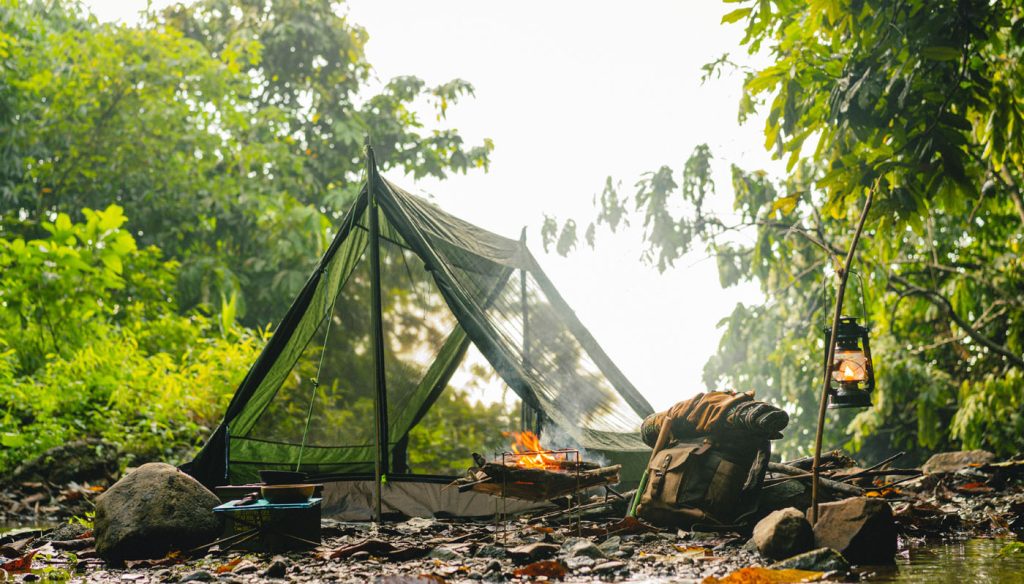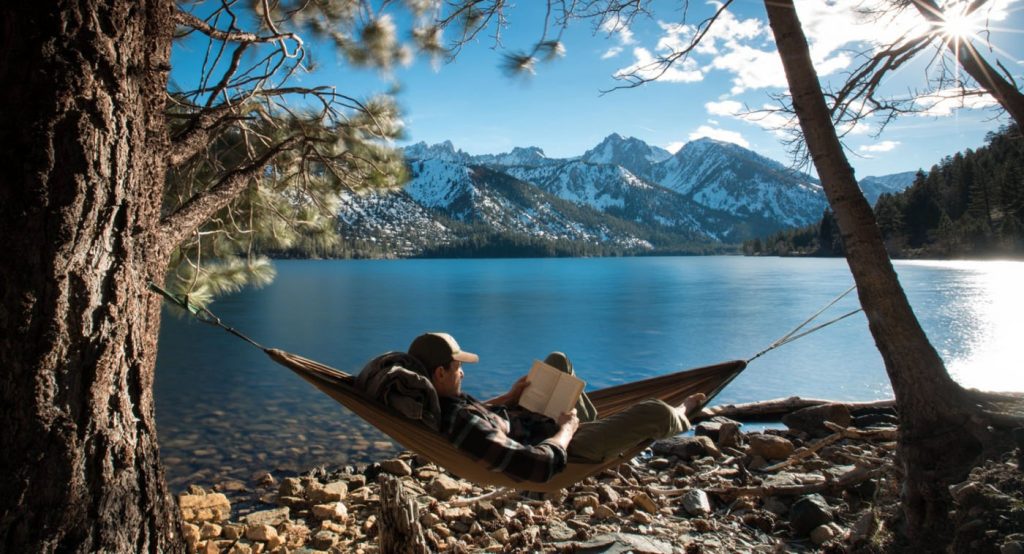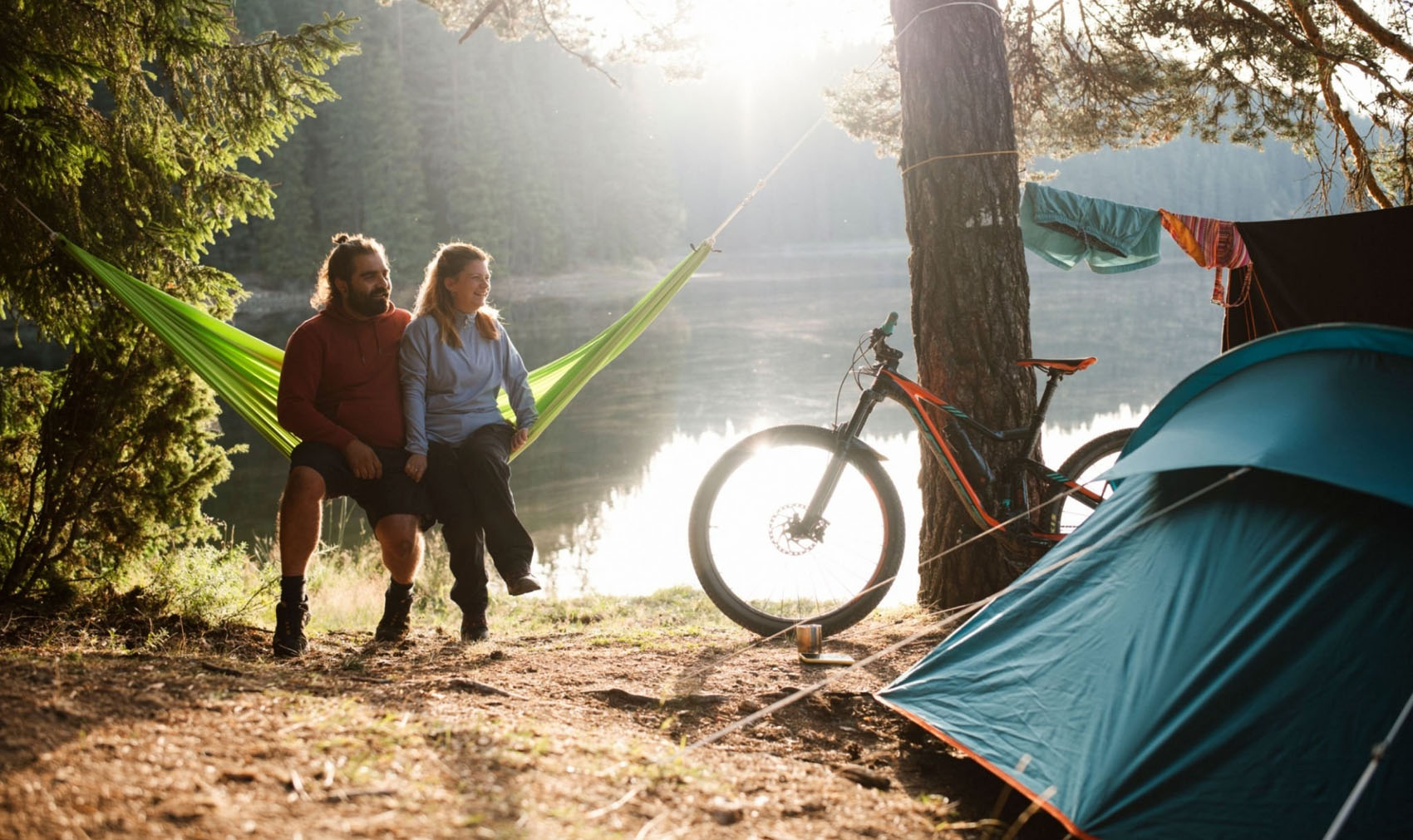Sleep is so important, and it’s so tempting to just give up on a night of restful sleep if you have unpleasant sleeping conditions. But are camping tents or hammocks better for your health?
There are pros and cons to both options, but tents tend to be warmer because they can trap heat in with one open side. On the other hand, lightweight hammocks are usually lighter, smaller, and more portable.
Read on to learn more about the design of tents and hammocks, as well as how they differ.
Tents vs Hammocks: What is the Difference
What is a tent?
A tent is a shelter that is erected using poles and fabric. They come in many different shapes and sizes, but the most common type is a dome. Tents are held up by using guy ropes attached to ground stakes.

Types of Tents:
- Backpacking tent
- Hot tents
- Canvas tents
- Dome tents
- Teepee Tents
- Hanging tree tents
- Screen Tents
- Pole tents
There are many different kinds of tents, from lightweight backpacking tents to heavy-duty military tents. Each tents has its own advantages and disadvantage.
Advantages of tent:
- Tents are durable and long lasting.
- Tents offer protection from the weather (rain, cold weather).
- Tents provide privacy and can be a place for storing your belongings.
- Tents keep you warm because of warmer air that surrounds the shelter.
- Tents are usually waterproof and windproof.
- They are expensive better than hammock.
- Tents are safer and more secure.
- They provide a sense of comfort, especially if you have a friend or family members with you, so as to guard from predators such as bears/polar bears, mountain lions etc…
- Tents are more durable as compared to hammocks.
- If a tent gets wet, you can get frostbite or hypothermia.
- If a tent is too small for your needs, you will have to move it every time it rains and snow melts.
- Tents are better used in summer because the people that use tents have larger campers that are not possible to be removed when conditions get bad (like in winter).
- Tents protect people from getting bitten by insects like mosquitoes etc…
- Tents are mostly used in beach and forest activities.
- Tents can keep you warmer because of warmer air that surrounds the shelter.
Disadvantages of tent:
- Tents are too heavy to carry if compared with hammock.
- Tent requires more setup time during camping season.
- You’ll have to unpack it at each camp site, if you go hiking or backpacking.
- Tents are bulkier than hammocks, they are easier to pack than hammocks.
- If a tent gets wet, you can get frostbite or hypothermia.
- If a tent is too small for your needs, you will have to move it every time it rains and snow melts.
What is Hammock?
A hammock, also known as a lounge chair, is a lightweight shelter that uses spider webbing and rope to suspend overhead. It hangs from a tree or other structure using attachment points. Hammocks can be one-person or two-person, but most are designed for single people.

Types of Hammocks
- Parachute Hammock
- Mexican Hammock
- Eagle Hammock
- Tree Hammock
- Slingshot Hammock
- DoubleTree Hammock
Advantages of hammocks:
- Hammock is more comfortable and less expensive than a tent.
- Hammock is portable and lightweight.
- Compared to tents, hammocks are easy to put up and take down. This can be done in just a few minutes, which means less time and effort spent trying to set up and take down a tent.
- Hammock is also much lighter than most tents, which means you don’t have to carry around extra weight. In fact, hammocks weigh almost nothing compared to traditional tents. This is especially useful if you happen to be hiking or backpacking.
- The lightweight nature of hammocks make them extremely portable. You can take them with you wherever you go and use them anywhere.
- You can sleep directly on the surface instead of an inflatable mattress, so you don’t have to worry about getting backaches.
Disadvantages of hammocks:
- Hammocks are not waterproof like tents; therefore, they can be uncomfortable in bad weather conditions.
- The hammock must be insured and inspected for defects, because it can break quickly.
- Hammock it is not made for protection from insects.
- You will have to remove the hammock from the tree every time a storm occurs to remove any water damage.
- If you have to sleep with someone else in the hammock, you have to make sure there is enough space around you so that no one’s feet are touching your body.
- It is not easy to get in and out of a hammock.
- You will have to learn the control the sway of a hammock to avoid falling off.
- Hammocks are less secure when compared with tents.
- They get hot when the sun is directly above you. For this reason, hammocks can be stifling.
- It can be hard for two people to fit in one hammock – one person may have to sleep on his or her side and the other can sleep on his or her back or stomach. Hammocks may not always be able to handle a temperature drop relatively quickly, so you may have to move your hammock if you are camping in cold climates (e.g., -30F/26C).
So, which is the best for camping?
The choice between a hammock and tent often comes down to which one is more comfortable. For example, if you are camping and hiking in warm weather where insects aren’t a concern, then a hammock may be the best option. Likewise, if you only plan to hike or backpacking in areas where there are trees available, then a hammock may be your best option.
On the other hand, if you’re out in the wilderness without much protection from bugs and precipitation, it’s probably better to have a tent.
In conclusion, it is easy to go on a short hike with a hammock and have a good time. But if you’re going to do more than a short hike, you can use either the hammock or tent depending on your needs and what you are camping for.
You can either choose to go tent or hammock, but the benefits of both are very similar. It all depends on your camping needs and personal preference.
Sukhen is a passionate blogger and traveler who visited many historical places in Bangladesh, Myanmar, India, and Thailand. He's an avid camper, so he shares his knowledge of camping and wildlife with his readers. He also helps readers plan their own camping trips. To know more, stay connected with Outdoor Awaits.

